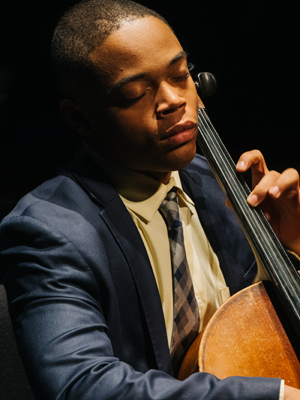Sophomore Levi Powe performed on the NPR show, “From the Top,” which aired on April 26, across the country. Powe, 19, studies cello with Dr. Theodore Buchholz at the Fred Fox School of Music.

He has won first place in the Tucson Symphony Concerto Competition, and the Civic Orchestra Concerto Competition and was a finalist in the ASCAP Morton Gould Young Composer Competition.
In 2018, Powe, a Tucson native, was selected as the 2018 First Place Junior Division Laureate of the Sphinx Competition, a national competition offering young black and Latinx classical string players a chance to compete under the guidance of an internationally-renowned panel of judges.
He has participated in masterclasses with Peter Anderegg (Phoenix Symphony Orchestra), Mary Ann Ramos, (Northern Arizona University), Joshua Roman (soloist), and Amit Peled (The Peabody Institute).
Powe has performed with New World Symphony, Buffalo Philharmonic Orchestra, South Bend Symphony Orchestra, Battle Creek Orchestra, Civic Orchestra of Tucson, the Tucson Philharmonic Youth Orchestra, the Southern Arizona Symphony Orchestra, and The Sphinx Symphony Orchestra.
“From the Top,” hosted by Greg Anderson and Elizabeth Joy Roe, is a non-for-profit organization that shares the stories of young classically-trained musicians as well as offering scholarships and art education.
Poema III by Marlos Nobre with pianist Elizabeth Joy Roe
Q&A WITH LEVI POWE ON “FROM THE TOP”

ROE: Levi, can we talk about this piece, Poema III, because it is filled with so many layers?
POWE: This piece was written by Marlos Nobre the composer and it seems as though he made it simple and you think ‘oh it’s simple,’ so it’s easy; it’s got a simple melody to it. Really, it seems that he made it a little bit simpler. He did shape the phrases, and the dynamic and the melodies … he did make it simpler, so that you have your own artistic freedom to … tell a story or paint a picture or a scene.
ROE: Are there certain emotions or story lines that you think of when you play Poema III?
POWE: Yeah, I like to imagine I’m out in the middle of the desert, just wandering along, walking along, maybe on top of a mountain somewhere.
ROE: I love that. That’s why you sound so great. I also love that you smash a lot of the stereotypes that people may have of young classical musicians. For example, I want you to talk about one of your main passions beyond music.
POWE: I love to hunt, actually. Believe it or not, in Tucson we do have deer down there … it’s dry … they’re few and far between. I like to hunt white tail deer. I’ll go up in the mountains for a day or two. Sometimes I don’t even hunt, I’ll just scout and look out, hike and enjoy the nature out there.
ROE: So, when you go hunting, what ends up happening? Do you end up eating what you hunt?
POWE: Yeah, absolutely. Deer meat is too good to waste in my opinion.
ROE: So, hunters and environmentalists may have things in common.
ANDERSON: As you talk Tucson and hunting, I am under the impression that you also love winter sports.
POWE: I do.
ANDERSON: What winter sports?
POWE: I love to ski. I’ve got family up in Canada, so I like to ski up there. I also like playing hockey, but I’d say my favorite winter sport is dog sledding.
ANDERSON: Really? What do you like about dog sledding?
POWE: It’s just when you are dog sledding and you are out there, you’ll be out in the wilderness padding through the snow and you hear the dog’s feet. You don’t really have to drive or anything, so you don’t have the loud noise of a four-wheeler. You are just out there in nature and you can just enjoy things in nature.
ANDERSON: Recently, you have decided to study business. What appeals to you about that?
POWE: I like that it is incredibly broad, there is so many things you can apply to a business degree. So, say if I graduate with a business degree, I am not limited to a certain field because there are always business applications in that field. So, if I really wanted to continue doing music with a business degree, there definitely would be pathways for me to do that.
ANDERSON: Congratulations, you are both practical and so tremendously artistic. You surely have an impressive future ahead of you.
POWE: I appreciate that. Thank you.
